Vegetarian Festival Thailand | Phuket Nine Emperor Gods | Ritual Purification

Thailand's Vegetarian Festival: Spiritual Devotion Through Extreme Rituals and Purification
Each autumn during the ninth lunar month, the island of Phuket and Chinese Thai communities throughout Thailand undergo a remarkable transformation. Streets fill with worshippers dressed in white, vegetarian food stalls replace meat vendors, and most strikingly, devotees perform astonishing acts of physical endurance that challenge Western concepts of religious devotion. This is the Vegetarian Festival (เทศกาลกินเจ, Tesagan Gin Je), Thailand's most extreme spiritual celebration. Despite its seemingly straightforward name, the festival extends far beyond dietary restrictions into the realm of spirit possession, dramatic physical mortification, and elaborate ceremonial processions. Centered around worship of the Nine Emperor Gods and the achievement of spiritual and physical purification, this nine-day celebration offers visitors a window into a fascinating cultural intersection of Chinese religious traditions, Thai spiritual practices, and extraordinary demonstrations of faith that have evolved into one of Southeast Asia's most visually spectacular and culturally significant festivals.
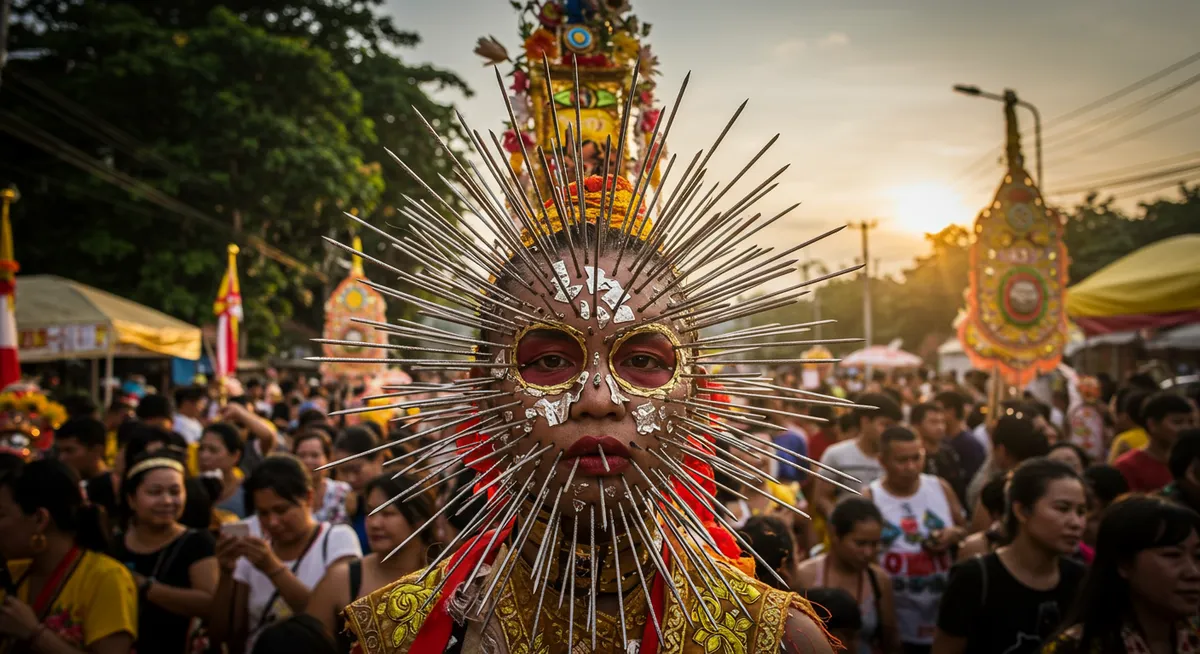
Origins and Religious Foundations
The festival's development represents a fascinating cultural evolution:
Historical Beginnings
The tradition emerged from specific historical circumstances:
- Chinese Mining Connection: Originated in the 1820s when a Chinese opera troupe visiting Phuket's tin mining communities fell ill with malaria
- Ritual Solution: The troupe recovered after observing strict vegetarian practices and rituals honoring the Nine Emperor Gods
- Community Adoption: Local Chinese miners adopted these practices, believing they brought health and prosperity
- Expanding Tradition: Over two centuries, the festival grew from a localized Chinese ritual to a major Thai cultural event
- Regional Variations: Similar festivals occur throughout Southeast Asia in Chinese communities but with notable Thai adaptations
Spiritual Significance
The festival encompasses complex religious beliefs:
- Nine Emperor Gods: Worship focused on the nine sons of Goddess Dou Mu, identified with the stars of the Big Dipper constellation
- Taoist Elements: Emphasizes purification, balance of energies, and communication with celestial deities
- Chinese Folk Religion: Incorporates spirit mediumship, ancestral worship, and ritual propitiation
- Buddhist Integration: Thai Buddhist elements blend with Chinese traditions in temple practices and rituals
- Purification Purpose: Aims to cleanse body and spirit, earning merit and ensuring good fortune
Festival Timeline and Key Ceremonies
The nine-day celebration follows a structured sequence of rituals:
Opening Ceremonies
The festival begins with elaborate rituals:
- Lantern Pole Raising: Go Teng poles erected at participating shrines to invite the Nine Emperor Gods to descend
- Deity Invitation: Elaborate ceremonies welcome the gods from the stars into the temples
- First Purification: Temples and surrounding areas cleansed through ritual washing, chanting, and incense
- Opening Processions: Initial parades announce the festival's commencement to the community
- Food Blessing: Ceremonies to purify vegetarian foods and festival kitchens
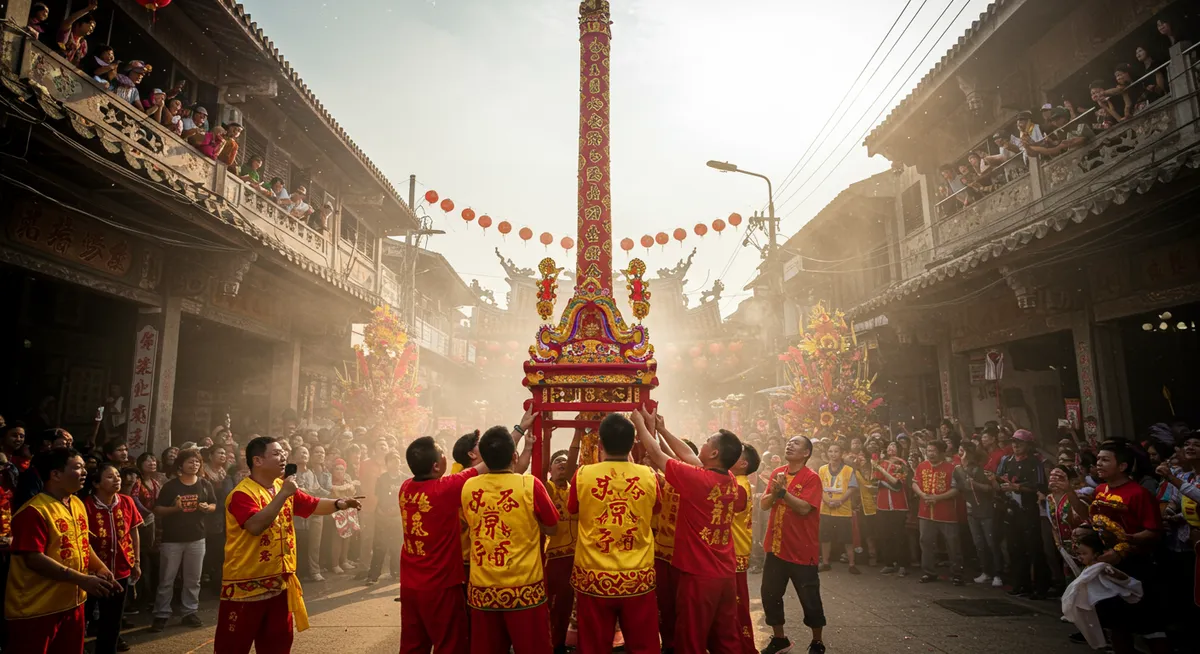
Daily Practices
Throughout the nine days, participants maintain strict disciplines:
- Dietary Restrictions: Pure vegetarian diet excluding all animal products, strong-smelling vegetables (onion, garlic), and alcohol
- White Clothing: Participants dress in white to symbolize purity and mourning
- Temple Visits: Daily prayers, offerings, and merit-making at Chinese shrines
- Ritual Bathing: Purification through water before religious activities
- Sexual Abstinence: Participants maintain celibacy throughout the festival period
- Morning and Evening Prayers: Structured devotional sessions at temples with chanting and offerings
Spirit Medium Preparations
The festival's most dramatic elements involve special participants:
- Mah Song Selection: Spirit mediums (mah song, literally "horses of the gods") are chosen through various signs or volunteer
- Purification Rituals: Intense cleansing practices prepare the mediums' bodies as suitable vessels
- Trance Induction: Through drumming, chanting, and ritual techniques, mediums enter altered states of consciousness
- Spirit Possession: Gods or spirits believed to enter and take control of the mediums' bodies
- Blessing Ceremonies: Before extreme rituals, mediums undergo protective rituals and blessings
Street Processions and Extreme Rituals
The most spectacular public aspects of the festival:
- Facial Piercing: Mah song pierce their cheeks, tongues, and other body parts with objects ranging from skewers to larger items like knives, swords, gun replicas, and household objects
- Street Processions: Possessed mediums parade through towns, blessing onlookers and businesses
- Fire Walking: Barefoot crossing of beds of burning coals to demonstrate divine protection
- Ladder Climbing: Ascending ladders with rungs made of sharpened blades
- Hot Oil Immersion: Plunging hands into boiling oil to retrieve ritual objects
- Self-Flagellation: Striking the body with various implements as acts of penance and purification
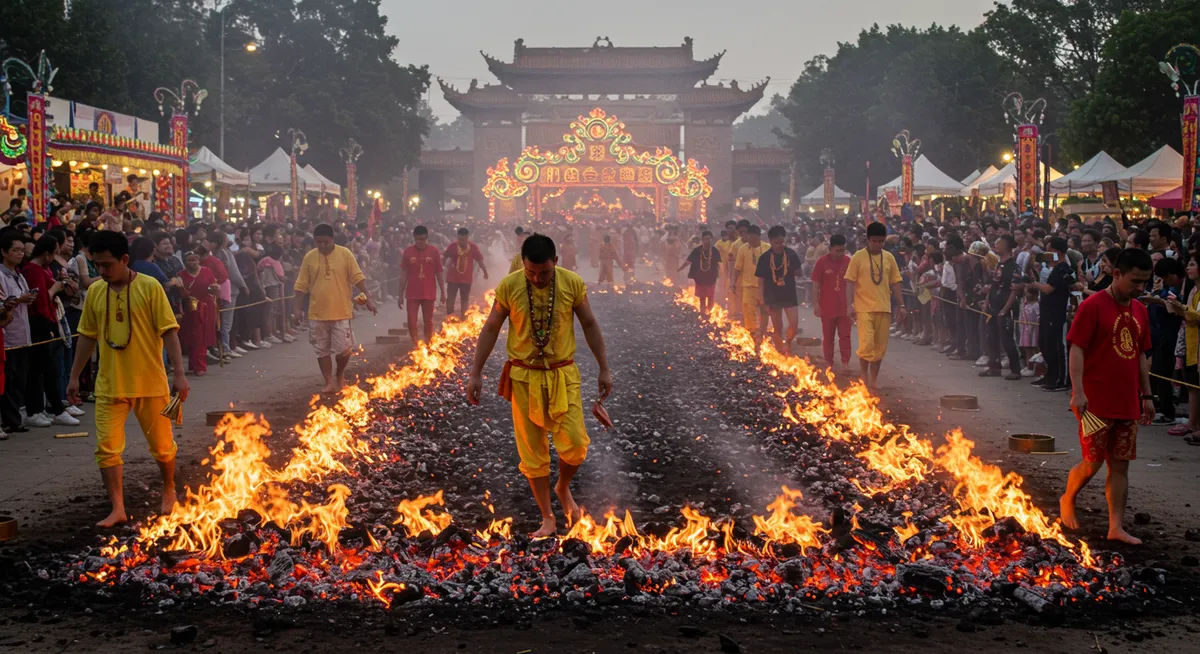
Closing Ceremonies
The festival concludes with specific rituals:
- Final Grand Procession: Most elaborate parade featuring all temple communities and spirit mediums
- Deity Farewell: Ceremonies to thank and bid goodbye to the Nine Emperor Gods
- Water Rituals: Release of lanterns, flowers, and offerings into bodies of water
- Lantern Pole Lowering: Removal of the Go Teng poles signifying the gods' departure
- Return to Normal Diet: Ceremonial transition back to regular eating practices
Cultural Significance and Beliefs
The festival embodies multiple layers of meaning:
Spiritual Protection
Many practices serve protective functions:
- Community Shielding: Extreme rituals believed to absorb negative influences and protect the broader community
- Exorcistic Elements: Loud noises, firecrackers, and dramatic displays intended to frighten and drive away malevolent spirits
- Merit Transfer: Devotees' suffering viewed as generating merit that benefits family members and ancestors
- Divine Intervention: The Nine Emperor Gods invoked to provide health, prosperity, and protection
- Balancing Forces: Rituals aimed at restoring cosmic balance between natural and supernatural realms
Medical and Health Beliefs
Physical purification underlies many practices:
- Detoxification: Vegetarian diet viewed as cleansing the body of impurities
- Medical Miracle Claims: Accounts of wounded mediums healing rapidly without infection or scarring
- Preventative Practices: Participation believed to ensure good health throughout the year
- Mental Clarity: Discipline and dietary restrictions aimed at achieving psychological benefits
- Historical Health Crisis: Origins tied to successful management of a malaria outbreak
Cultural Identity
The festival reinforces important social bonds:
- Chinese Thai Heritage: Celebrates and preserves the cultural identity of Thailand's significant Chinese population
- Community Cohesion: Brings together different segments of society in shared ritual experiences
- Transgenerational Connections: Involves participants of all ages in maintaining traditions
- Culinary Traditions: Showcases specialized vegetarian cooking techniques developed over generations
- Cultural Syncretic: Demonstrates the integration of Chinese traditions into Thailand's broader cultural landscape
Experiencing the Festival as a Visitor
For travelers interested in witnessing this remarkable event:
Practical Information
Essential details for planning your visit:
- Festival Timing: Typically falls in September or October, based on the lunar calendar (ninth month)
- Main Locations: Phuket hosts the largest celebrations, particularly in Phuket Town
- Key Temples: Jui Tui Shrine and Bang Neow Shrine in Phuket Town feature the most elaborate ceremonies
- Other Locations: Significant celebrations also in Bangkok (Yaowarat), Krabi, Phang Nga, and Trang
- Festival Duration: Nine days, with the most dramatic processions typically occurring on days 6-9
Visitor Etiquette
Guidelines for respectful attendance:
- Dress Code: Modest clothing recommended; white clothing appreciated but not required for visitors
- Temple Respect: Remove shoes before entering shrine buildings, avoid pointing feet at sacred objects
- Photography Considerations: Respectful distance for photographing rituals, particularly extreme acts
- Dietary Participation: Consider trying festival vegetarian food as a form of cultural engagement
- Personal Space: Maintain appropriate distance from processions and ritual activities
- Blood Sensitivity: Be aware that some ceremonies involve blood and graphic elements that may disturb sensitive viewers
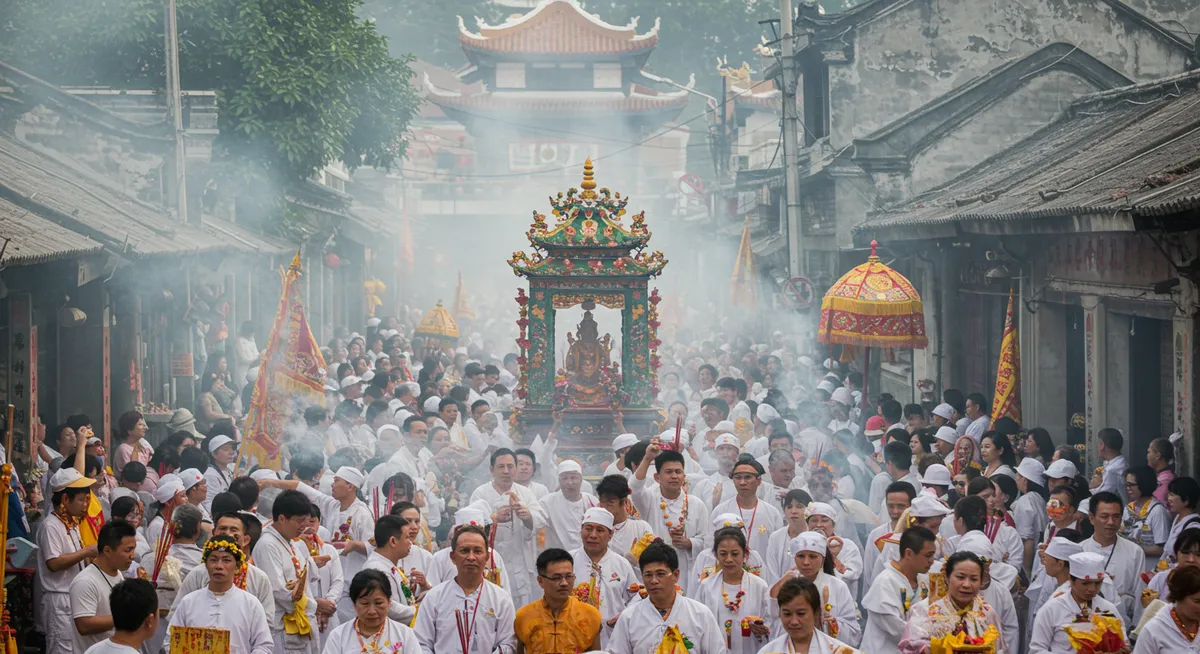
Culinary Experience
The festival offers unique food opportunities:
- Je Food Markets: Temporary food courts dedicated to festival-approved vegetarian cuisine
- Yellow Flag Identification: Restaurants and stalls displaying yellow flags indicate vegetarian menu options
- Meat Substitutes: Creative dishes using wheat gluten, tofu, and mushrooms to simulate traditional meat dishes
- Regional Specialties: Different areas feature distinctive local vegetarian adaptations
- Street Food Experience: Opportunity to sample a wide variety of vegetarian versions of Thai classics
- Symbolic Foods: Dishes prepared with specific symbolic meanings and ritual significance
Viewing Recommendations
Strategies for the best festival experience:
- Procession Routes: Research specific procession schedules and routes published by local tourism authorities
- Early Positioning: Arrive early for good viewing spots at popular processions
- Temple Visits: Morning and evening visits to shrines provide less crowded experiences of rituals
- Local Guidance: Consider hiring a knowledgeable local guide for context and access
- Photography Tips: Morning processions offer better lighting, while evening events feature more dramatic firelight
- Traffic Considerations: Be aware that major roads close during processions; plan transportation accordingly
Understanding Extreme Ritual Practices
Context for the festival's most striking elements:
Spirit Mediumship
The role of mah song in Thai-Chinese tradition:
- Divine Selection: Most mediums report being chosen by gods rather than volunteering for the role
- Trance States: Mediums enter altered states of consciousness through ritual techniques and temple atmosphere
- Community Status: Year-round social position often affected by service as a festival medium
- Protective Function: Believed to take on suffering that would otherwise affect the community
- Gender Aspects: Both men and women serve as mediums, though traditionally more men perform extreme acts
Scientific Perspectives
Contemporary understanding of extreme ritual phenomena:
- Pain Suppression: Altered states of consciousness demonstrably affect pain perception
- Endorphin Response: Intense ritual experiences trigger natural pain-blocking chemicals
- Social Support: Community presence and expectation create powerful psychological effects
- Preparation Techniques: Specific methods used to clean and prepare implements reduce infection risk
- Skilled Practitioners: Experienced mediums and assistants know techniques to minimize permanent damage
Evolution of Practices
How the festival has changed over time:
- Increasing Extremity: Contemporary body modifications more elaborate than historical practices
- Media Influence: Photography and social media have affected the visual aspects of the festival
- Tourism Impact: International attention has brought both preservation efforts and commercialization concerns
- Safety Regulations: Modern festival organization includes medical standby teams and some oversight
- Younger Generation Participation: Changing demographics of mediums reflects evolving cultural attitudes
Beyond Phuket: Regional Variations
The festival extends beyond its most famous location:
Bangkok Celebrations
The capital's distinctive approach:
- Yaowarat (Chinatown) Focus: Concentrated activities in Bangkok's historic Chinese district
- Culinary Emphasis: Greater focus on vegetarian cuisine with elaborate restaurant offerings
- Urban Adaptations: Modified processions suitable for congested city environments
- Teck Sia Ritual: Unique self-mortification using specialized ceremonial axes
- Extended Duration: Some Bangkok celebrations continue beyond the standard nine days
Other Thai Regions
The festival takes different forms throughout Thailand:
- Phang Nga: Intimate community celebrations with distinctive local traditions
- Krabi: Notable for traditional Chinese opera performances for both human and divine audiences
- Trang: Known for elaborate deity processions and distinctive southern vegetarian cuisine
- Chiang Mai: Northern variations incorporating elements of Lanna Thai culture
- Samui: Island interpretations with influences from both Phuket and mainland traditions
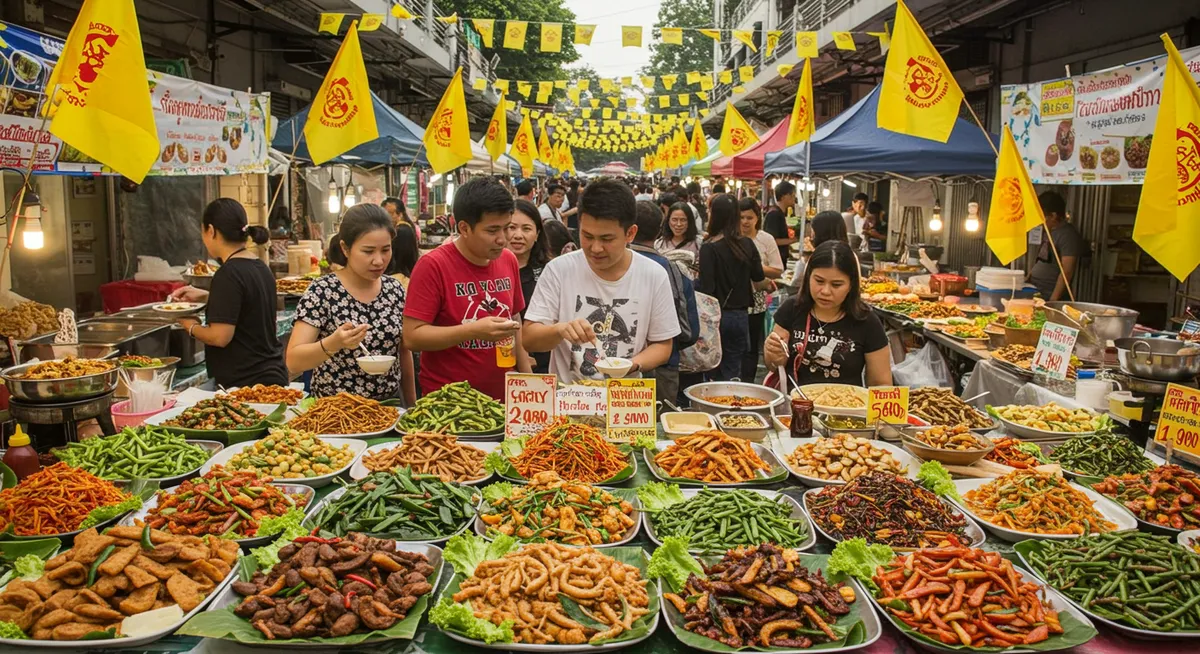
Southeast Asian Connections
Related festivals throughout the region:
- Malaysia's Nine Emperor Gods Festival: Particularly significant in Penang with similar but distinct practices
- Singapore's Nine Emperor Gods Celebration: Urban adaptation with strong emphasis on temple rituals
- Vietnam's Vegetarian Festival: Related observances among Vietnam's ethnic Chinese population
- Myanmar's Nine Gods Festival: Small-scale celebrations in Chinese communities with unique local elements
- Regional Variations: Demonstrates how Chinese traditions have adapted to different Southeast Asian contexts
Planning your Vegetarian Festival visit
For the most authentic experience, consider staying in Phuket Town rather than beach areas during the festival, placing you close to the main shrines and procession routes. Visitors with children or those sensitive to graphic imagery should be selective about which events to attend.
Be aware that accommodations fill quickly, especially for the final weekend of the festival when the largest processions take place. Book at least 3-4 months in advance and be prepared for early mornings if you wish to witness key ceremonies.
Explore More Asian Cultural Festivals
If you're fascinated by the Vegetarian Festival, discover other extraordinary Asian celebrations that showcase the continent's rich cultural heritage:
Ghost Festival
East Asian tradition honoring ancestors with lanterns, offerings, and spiritual ceremonies.
Hornbill Festival
India's "Festival of Festivals" showcasing the diverse tribal cultures of Nagaland.
Rainforest World Music Festival
Malaysia's unique celebration of indigenous music traditions in a spectacular jungle setting.
Nyepi
Bali's extraordinary Day of Silence preceded by monster parades and purification rituals.
Songkran
Thailand's famous water festival celebrating Thai New Year with cleansing rituals and joyful water fights.
Wakakusa Yamayaki
Japan's dramatic mountain burning festival with ancient origins and spectacular night views.
Return to our Asian Cultural Festivals Guide to discover more extraordinary celebrations across the continent.